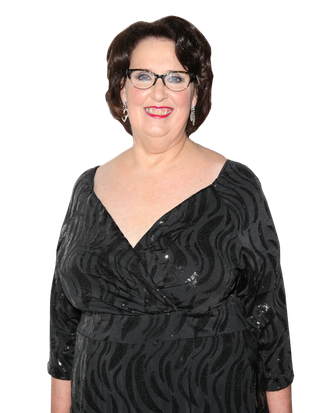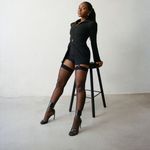
Spoilers for The OA below.
One of the most delightful surprises in Netflix’s The OA is actress Phyllis Smith. You may be familiar with Smith from her longtime role as Phyllis Vance in The Office, or her voice acting as Sadness in Disney’s Inside Out, but none of that indicated that she was headed for a major role in a sprawling sci-fi epic about near-death experiences and interdimensional tunneling. And yet, here she is, playing a schoolteacher named Betty Broderick-Allen — better known as BBA — and getting tangled up in an effort to defy death and the laws of physics.
A veteran performer, Smith spent decades working as a dancer, and she got to show her chops thanks to the show’s focus on supernatural physical incantations known as the Movements. As it turns out, Smith’s meshing with The OA’s operatic metaphysics is quite a natural fit, as she firmly believes in powerful forces beyond human understanding. We caught up with Smith to talk about angels, dance injuries, and her pet turtles, Speedy and Alvin.
Thanks for chatting with me!
No worries. Where are you? Are you in California?
No, scenic New York City. I’m sitting in my apartment, surrounded by my cats.
The fact that you have a cat means you’re a good guy.
Well, if having one cat makes you a good guy, you’ll be pleased to hear that I have two.
Well, you’ll be pleased to know I have four.
You don’t.
Yes, uh huh.
What are their names?
Don’t laugh, because I’m not very inventive when it comes to cat names. They’re grey cats, so I have Shy Boy, I have Little Grey — those are the two twins — then I have Sweet Face, who has a very sweet face, and Princess, who turned out to be a prince. Those are my four babies. They went to New York, too. They all went to New York when we filmed The OA.
What a caravan.
I had my four cats and two turtles.
You have two turtles? What are their names?
Speedy and Alvin are the turtles. Speedy’s about 65 and Alvin’s about 15, I guess. I’m serious about my family.
Speaking of family, let’s talk about the show. How did this part come about and how was the show first described to you?
Oddly enough, it came out of the blue for me, because I don’t have an agent. I got an email from the New York casting director [for The OA] and she said that [series creators] Zal [Batmanglij] and Brit [Marling] were doing the show and they would like to meet with me. Even after I was hired, the only thing I ever saw about the show in print were the six pages of sides that I’d received. That was the first scene that you see me in where I’m talking to Brit. That’s the only information and written word that I’d seen prior to actually going to New York. I thought it would be an interesting, good role for me, but I had nothing to go on but that six-page scene.
It worked out that I met with Zal and Sarah Esberg from [The OA’s production company] Plan B. I thought I was going to read with someone. It turned out to be a sit-down, just talking to each other. When I left that day, I had such a positive, wonderful, unexplainable feeling. Then I had a second meeting with Brit. I got all eight scripts. I had to read all eight of them in that one weekend and I couldn’t put them down. I’m glad I didn’t know ahead of time.
What did the story make you think about? What did it make you consider about life, the universe, and everything?
Even before The OA, I was a very spiritual person. I believe in angels. I’ve had an experience that … I don’t know the right label to put to it, if it was an angel or Jesus or what. Nobody knows anything for sure about that, but I know that I had an encounter and I know that things exist beyond this realm, most definitely. I’m grounded in that. Who knows what the second season will be, if we have a second season, but my stance is that [Brit Marling’s character] truly was an angel and we’ll see how it goes from there. Near-death experiences, I’ve not had one of those as of yet.
I’m glad to hear it.
You always say “yet” because you don’t want to tempt anybody. I know that [near-death experiences] do exist, that people have returned from other realms so it’s, you know — miracles do happen. Boy, do we need them in this everyday world that we’re living in now. The dangers that you encounter just walking out your front door are … you never know anymore. In some ways, [the show] reinforced what I already had believed and also, opened up the different realms of — what is the term when you go to different, like, two worlds are going on at the same time? What is that called?
Parallel universes?
Yeah, I’m not too sure about that. I haven’t come to terms with that yet. That’s still a big question mark in my mind.
Speaking of the metaphysical, one of the things that really sets the show apart is the Movements, the supernatural quasi-dance sequences that you and other characters do. What was it like to learn and rehearse the Movements?
I was in St. Louis and it was just about this time last year. They brought a choreographer to St. Louis. The other actors who were involved in the Movements had been rehearsing, I believe, in the New York area. I rehearsed here about four, five times with two different gentlemen. I used to be a dancer. The use of your voice and your breath and the sound with the movement really made them — what’s the word? Almost tribalistic or very organic. They were hard! Hard in the respect that everything needed to be exact, like the turn of the hand, like the bird that fluttered and you caught it. When you see everyone together doing it, and how it was edited, it was incredible.
When everyone’s synched up on the Movements, it’s something to see. Can you tell me about filming the climactic scene in the final episode, where the quintet do the Movements together to stop a school shooter?
I remember when we first did the Movements in front of the kids who were in the cafeteria at that time. You could hear them gasp. They were gasping like, wow. It was a really interesting reaction because no one, other than the five of us and the choreographer, had ever really seen the Movements, I don’t think. Their reaction was so great, to hear them gasp. I think some applauded.
When you’re doing the Movements, how do you feel? Or are you just thinking about doing the motions right?
First of all, as a dancer, I just wanted to do everything exactly the way they wanted it. It was a lot of different shapes. Then, when the sound was added, that gave you a completely different feel, when you’re doing the gasping and the hissing. That, to me, the sound brought the emotion into the Movement. There was one Movement in particular that made me feel very protective and strong: When we stepped forward and both of our hands hit our chests and then opened out. That was the Movement for me that I was, like, daring the shooter. It wasn’t about your body or about the possibility of being shot. It was about the Movement itself. It did take over.
How often have you danced in your career?
This had rekindled my fire in me to dance. I danced the majority of my life. I started when I was 7 and I stopped when I was close to 37 or 38. I danced the majority of my life, but then when I stopped, I stopped. It took me a while to get back into some sort of shape with these Movements. I’ll tell you one thing: Prior to having doing these Movements, I’d had a tear in my shoulder. These Movements and our warm ups and stuff, I didn’t have to have surgery on it. It really seemed to help it.
Do you think the power of the Movements healed you or was it just good exercise?
It was just good exercise, and I think it was not the power of the Movement but the consistency of what we did to warm up. It helped to rebuild the muscles and things that were out of place. I’m not saying that the Movement did it. I’m saying the consistency of it. I feel like I might have some more movement in this old body. It gave me the impetus to work out more and get into better shape.
Have you started dancing again outside of the show?
No, not yet. I’m just thinking about it. I haven’t gotten that far yet.
The first step is wanting to do it.
Exactly.
What do you think your character learns over the course of the show?
For BBA, I think it gave her a little confidence into herself. First of all, she found camaraderie with her boys and with the OA, and I think it gave her a little bit of confidence to explore other areas of her life. She’s got her car fixed and she’s going to go visit a cousin on the West Coast. It’s like she has a new lease on life. We shall see where that goes.
Let’s talk about the scenes with Brit in the unfinished attic. When she’s telling the OA’s story, how do you make that work? You’re just sitting there for the whole thing, so you don’t get to emote with lines.
I’ll tell you: Brit is such a wonderful storyteller that it wasn’t an effort to listen to her or to act like you were listening. Every word that comes out of her mouth, it draws you in. If the director would say, “Okay, elaborate on this a little bit,” she could make that story on the spot.
You mean she improvised some of the bits during shooting?
There were some. Only when the director asked her to do so. When he would suggest to her to embellish something, she could do it immediately. We were just mesmerized by her ability to keep us there. The most challenging part of the attic for me was to get up and down off the floor. [Laughs.] Those young kids could bounce up and down off that floor without a problem. It took, like, a derrick to get me off the ground.
Do you worry about getting pigeonholed in roles as a dour woman, like the ones you’ve played in The Office, Inside Out, and here in The OA?
I don’t really think about being pigeonholed so much. This role allowed me to explore a different side. In that first scene, I’m strong and angry. I usually don’t get to play that, so that was a good, serious note for me. I’m just happy and blessed to be working on good projects. I don’t have an agent, like a theatrical agent, but I think the things that have come to me are from some other power bigger than me. Does that make sense?
Yes.
Zal and I routinely said, “Oh, you’ve got the big agent.” In our comical way, you know.
Has Sadness in Inside Out given you a whole new generation of fans?
It has, yeah. I’ve got little kids coming up to me. Just the other day, this little kid was slightly confused because the mom said, “Zoe, this is Sadness!” The kid looked at me and was like, “What are you talking about? She’s not blue!” It depends on their age, but yes, I’ve got a whole new age group of kids now. It’s all good. There’s nothing bad. It’s all good.
This interview has been condensed and edited.




